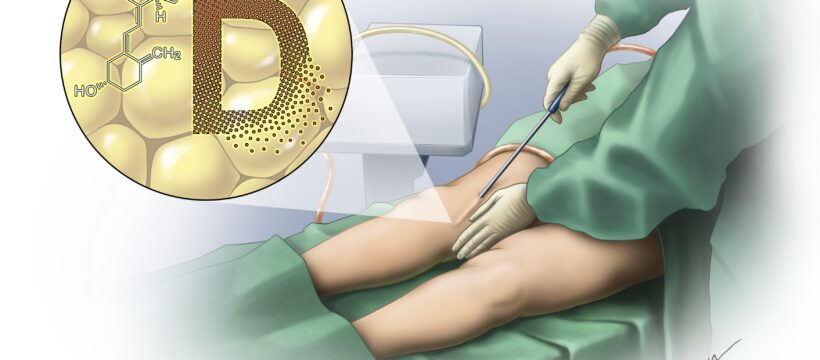Anaemia heightens the risk of postoperative complications following high-volume liposuction. Karl Landsteiner University of Health Sciences examines the consequences of lipoedema treatment.
Krems, Austria, 18. February 2025 – High-volume liposuction significantly increases the likelihood of secondary complications in anaemic lipoedema patients. This is the key finding of an internationally recognised study conducted by Karl Landsteiner University of Health Sciences (KL Krems). Based on the analysis of more than one hundred cases of lipoedema, it was clearly demonstrated that patients’ blood parameters have a substantial impact on postoperative safety after high-volume liposuction. In contrast, the volume of fat removed was of lesser significance. These insights may contribute to refining treatment strategies and enhancing patient safety in lipoedema surgery.
Lipoedema, a chronic disorder of the subcutaneous fatty tissue, affects almost exclusively women and results in painful swelling and restricted mobility. Treatment with high-volume liposuction often provides relief but carries risks, particularly due to blood loss and the consequent postoperative anaemia (a deficiency of red blood cells/haemoglobin). To enhance the safety of these procedures, researchers at KL Krems have investigated the correlation between preoperative anaemia in certain patients and postoperative complications.
The Challenge: Anaemia
Dr Tonatiuh Flores, project leader and physician at the Clinical Division of Plastic, Aesthetic, and Reconstructive Surgery at KL Krems, explains: “Our findings reveal that preoperative anaemia is the primary risk factor for postoperative complications. Patients with low haemoglobin levels prior to surgery faced a significantly higher risk of complications.” The retrospective analysis encompassed 121 lipoedema surgeries, categorising patients into two groups (liposuction < 5 litres and > 5 litres). It was observed that the volume of liposuction had no significant impact on the complication rate, whereas there was a direct correlation between preoperative haemoglobin levels and subsequent complications.
The Solution: Optimal Preoperative Care
The study underscores the importance of preoperative optimisation. Prim. Assoc. Prof. Dr Klaus F. Schrögendorfer, senior author and head of the Clinical Division of Plastic, Aesthetic, and Reconstructive Surgery, adds: “Meticulous patient selection and optimisation of haemoglobin levels before surgery are crucial to minimising risk. The findings support the approach of addressing preoperative anaemia before undertaking high-volume liposuction.”
This research marks another vital step towards enhancing the safety and efficacy of lipoedema treatment. Earlier this year, Dr Flores‘ team demonstrated that managing patients‘ vitamin D levels also contributes to better outcomes. Vitamin D levels are often low and further depleted by liposuction. With these study, KL Krems reaffirms its pioneering role in patient-centred research. The results could inform new standards in surgical treatment and improve patients’ quality of life.
Original publications: Lipedema: Complications in High-Volume Liposuction Are Linked to Preoperative Anemia.Tonatiuh Flores, Barbara Kremsner, Jana Schön, Julia Riedl, Hugo Sabitzer, Christina Glisic, Kristina Pfoser, Jakob Nedomansky, Konstantin D. Bergmeister and Klaus F. Schrögendorfer. J. Clin. Med. 2024, 13, 7779. doi.org/10.3390/jcm13247779. https://kris.kl.ac.at/en/publications/lipedema-complications-in-high-volume-liposuction-are-linked-to-p
High-Volume Liposuction in Lipedema Patients: Effects on Serum Vitamin D. T. Flores, C. Kerschbaumer, F. J. Jaklin, J. Nedomansky, P. Wolf, M. Weber 1, K. D. Bergmeister & K. F. Schrögendorfer. J. Clin. Med. 2024, 13, 2846. doi.org/10.3390/jcm1310284. https://kris.kl.ac.at/en/publications/high-volume-liposuction-in-lipedema-patients-effects-on-serum-vit
Karl Landsteiner University of Health Sciences (02/2025)
The Karl Landsteiner University of Health Sciences (KL Krems) is an educational and research institution on the Campus Krems and recognised throughout Europe. KL Krems offers modern, demand-oriented education and continuing education in medicine and psychology as well as a PhD programme in Mental Health and Neuroscience. The flexible educational programme is tailored to the needs of students, the requirements of the labour market and the challenges of science. The three university hospitals in Krems, St. Pölten and Tulln and the MedAustron Ion Therapy and Research Centre in Wiener Neustadt guarantee clinical teaching and research of the highest quality. In its research, KL Krems focuses on interdisciplinary fields with high relevance to health policy – including biomechanics, molecular oncology, mental health and neuroscience as well as the topic of water quality and the associated health aspects. KL Krems was founded in 2013 and accredited by the Austrian Agency for Quality Assurance and Accreditation (AQ Austria).
Scientific Contact
Dr. Tonatiuh Flores
Clinical Division of Plastic, Aesthetic and Reconstructive Surgery
University Hospital St. Pölten
Karl Landsteiner University of Health Sciences
Dunantplatz 1
3100 St. Pölten / Austria
E Tonatiuh.Flores@kl.ac.at
W https://www.kl.ac.at/
Karl Landsteiner University of Health Sciences
Mag. Selma Vrazalica, BA
Communication, PR & Marketing
Dr.-Karl-Dorrek-Straße 30
3500 Krems / Austria
T +43 2732 72090 237
M +43 664 883 99 603
Copy Editing & Distribution
PR&D – Public Relations for Research & Education
Dr. Barbara Bauder-Jelitto
Kollersteig 68
3400 Klosterneuburg / Austria
M +43 664 1576 350
E bauder@prd.at
L https://www.linkedin.com/company/prd-public-relations-für-forschung-bildung

